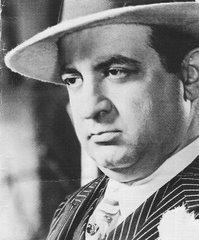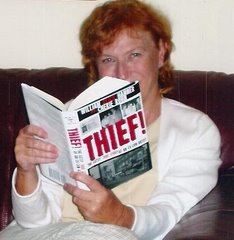
 Wasn't what I expected. Instead of being entertained, at the very least, I gagged my way through Frank Lucas's ego-driven fantasy, his auto-biography called Original Gangster. (The movie American Gangster starred Denzel Washington as Lucas.) What's more, I came away with the impression that Lucas is one consummate jerk.
Wasn't what I expected. Instead of being entertained, at the very least, I gagged my way through Frank Lucas's ego-driven fantasy, his auto-biography called Original Gangster. (The movie American Gangster starred Denzel Washington as Lucas.) What's more, I came away with the impression that Lucas is one consummate jerk.
Consider these Lucas statements from his book:
“She [first wife] was always needling me to get married. I finally agreed—for no other reason than I wanted her off my back. I didn’t take marriage vows very seriously.”
“I didn’t understand how people could use the stuff [heroin.] But that wasn’t my concern. I was an entrepreneur. Not a psychologist. Not a social worker.”
“I was drunk off power…I really started to think I was invincible. Forget that what I was doing was a crime and that it can be argued that I was completely immoral. I was an uneducated black man from rural
“I slipped into the coat and adjusted the hat on my head and took in my reflection in the full-length mirror. All I could do was let out a low whistle and make a 360-degree turn. My shit was hot.”
And after he was finally shut out of hustling heroin:
“What was I supposed to do now? Be a janitor? Work at a fast-food restaurant? ...Getting caught and locked up was just an occupational hazard.”
The above quotes are merely a sampling from Lucas’s life story—a tale short on facts and long on self aggrandizement.
Well-known true crime expert and investigate journalist Ron Chepesiuk interviewed Frank Lucas for his non-fiction book, Gangsters of Harlem prior to the book’s release in 2007. Ron also wrote the recently released book, Sergeant Smack, the life of Ike Atkinson, head of a $400 million Southeast Asian heroin smuggling operation. Mob Speak was eager to hear Ron’s take on Frank Lucas and his association with Ike Atkinson.
[Mob Speak considered some of the statements below so important, we highlighted them in red.]
MS: How did you first get interested in Frank Lucas?
RC: When I was researching my book Gangsters of Harlem, I decided to profile Frank Lucas for the book and used my sources to arrange an interview with him. In the interview, he kept referring to Ike Atkinson, whom he called his cousin, which I later learned was false, and talked about how Atkinson had helped him to pioneer the Asian connection and move heroin in the coffins of dead U.S. soldiers from the Vietnam War. I thought, I have to look into this and find out what Atkinson has to say about his relationship with Lucas. I learned that Ike was in jail for 31 years at that point and had never given an interview. Not a good sign for a journalist like me. But I sent a letter to him in the prison where he was incarcerated. Fortunately, I mentioned that I had talked to Lucas. Atkinson was curious and agreed to see me. During the interview, he became livid when I told him what Lucas had said about him. I describe the prison interview scene in my book, Sergeant Smack www.ikeatkinsonkingpin.com.
MS: What research have you done on Lucas?
RC: I have researched Lucas’ life and allegations perhaps more than any other journalist. In my profile of Lucas for my Harlem book www.ronchepesiuk.com, I interviewed DEA and NYPD sources that arrested and interrogated him. I also looked through court records and interviewed people who lived in
MS: Did you read Lucas’s bio, Original Gangster?
RC: Yes, I did. I heard through the grapevine that Lucas was “going to tell all” about his relationship with Ike in his autobiography. I knew that Lucas has been caught in lies about his life story since the movie American Gangster appeared, and I was curious to see what he had to say.
MS: What’s your opinion of the bio?
RC: The book is a kind of a bad joke perpetrated on the reading public. Lucas doesn’t even mention Ike anywhere in the book. Could you believe that? Now instead of going to meet Ike in
MS: No doubt you saw the movie American Gangster starring Denzel Washington as Frank Lucas. What was your impression of the movie?
RC: Well if I didn’t know anything about Frank Lucas’s life, I might have liked the movie, although I still would have noticed the holes in the story line. For example, in the movie Lucas has a cousin in
MS: In the movie, they tried to portray Lucas as a good snitch who only turned in corrupt cops. Lucas tries to defend his snitching along the same lines in his book Original Gangster. He rationalizes, “I could take them down. I had never been one to drop dime on anyone. It just wasn’t how I got down and it had never been necessary. But the cops I’d dealt with were a different story. There was no honor among thieves the way there is among drug dealers.” What’s your take on this?
RC: This is a real joke. It’s true there was serious corruption in law enforcement in
MS: While reading the Lucas autobiography, I was struck by the fact that he uses few real names and no dates. There’s also a great deal of generalizing and important events are missing. Why do you think he did that?
RC: He doesn’t mention dates and real names, even when there is no reason to do it. Very smart. By doing that, he doesn’t leave a concrete trail to follow so someone could check out the credibility of his story. He changed names when there was reason to do it. For example, he calls Ike’s Jack American Star Bar “Ritchie’s place.” Why? It helps him cut Ike out of the story. There are plenty of other examples, but you get the picture.
MS: Any truth to the conspiracy theory that heroin was shipped from Vietnam using the “cavers of dead servicemen” That was the climax of the movie.
RC: None whatsoever. I describe the conspiracy theory as the biggest hoax in the history of the international drug trade. In researching my book Sergeant Smack, I interviewed retired customs officials and DEA agents as well as journalists, government officials and morticians and others who somehow were involved with the story. No one has ever been arrested or convicted because they were involved in the conspiracy. No heroin was ever found in the coffins and dead bodies of American servicemen who died in Vietnam. No one has ever blabbed or bragged about it. No government investigation has found anything. Nothing, nothing. There is more credence in the conspiracy theory that Elvis is not dead; aliens kidnapped him.
MS: Okay, Ron. As you see it, what is the truth about Frank Lucas?
RC: Well, he did exist (laughs). Seriously, he was a drug dealer operating in the New York-New Jersey area in the 1970s. He had a significant operation but it was not the biggest, as Lucas and Hollywood claims. He got his dope primarily from La Cosa Nostra, not from
MS: What was Frank Lucas’s true relationship with Ike Atkinson?
RC: The two did have a working relationship in the drug trade, but Ike was the main man and Ike Atkinson, not Lucas, pioneered the Asian heroin connection. Lucas claims that Ike helped him move drugs via the cadaver-heroin connection. This is a lie because the connection is a hoax as I show in my book, Sergeant Smack.
MS: I’ve actually done considerable research of my own on this next question. Why do you think Lucas has gotten such a free ride with the media when it appears no one but you have really checked out his story?
RC: You’ve answered the question. The legend of Lucas, American Gangster, is a myth that the media and lazy journalism has helped create. I am the only journalist who has checked out his story. This is remarkable considering all the holes and contradictions in his story. It’s a sad reflection on the state of the media today.
MS: Ron, thanks for a thought-provoking and most interesting interview. We will gladly publish a response from Frank Lucas or anyone else.
***
Page down to read Mob Speak’s candid interview with Ike Atkinson on June 28, 2010 on his bio entitled Sergeant Smack.
Be sure to check out, The Trafficantes—Godfathers from Tampa, Ron Chepesiuk’s latest book available online and in bookstores.







